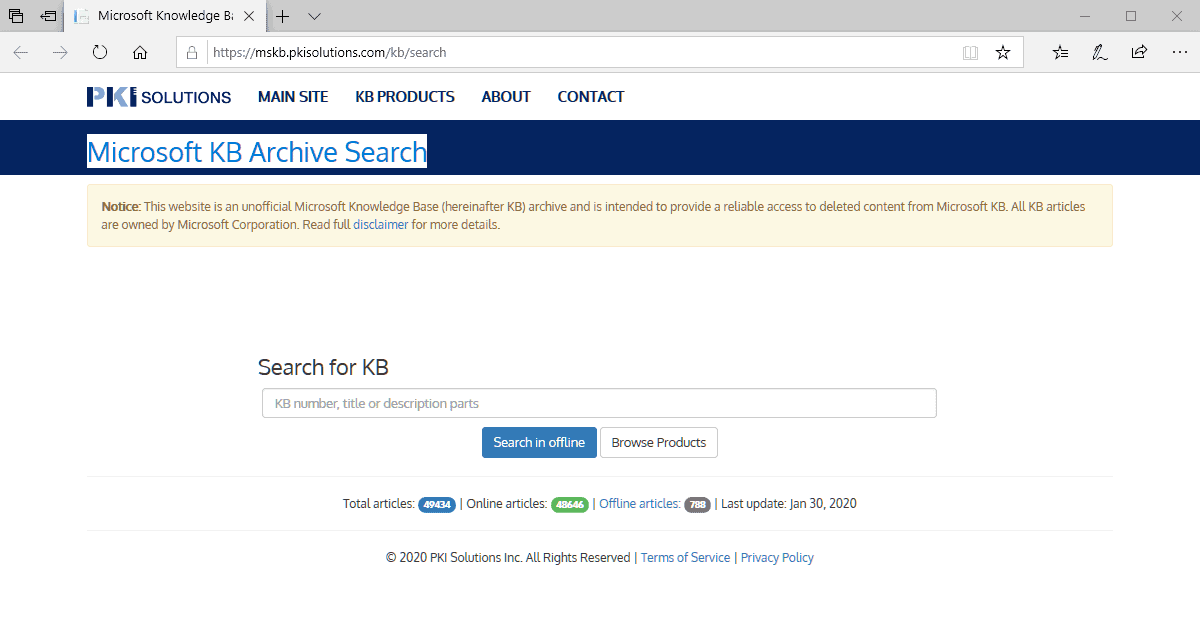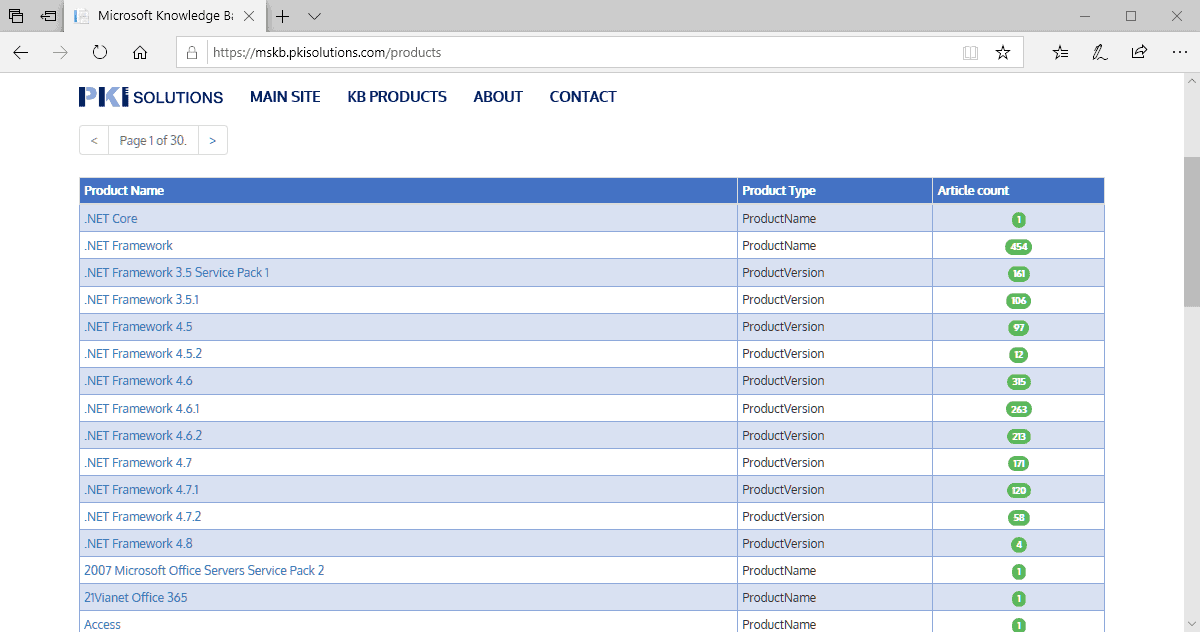Look up deleted Microsoft KB articles

Microsoft started to use its Docs website in 2016 to publish new articles. The company retired the classic MDSN and Technet sites and migrated these to an archive on the Docs site as well.
The company started to clean up its support pages in 2018 by deleting articles on these sites. It is unclear how many articles were deleted by Microsoft but users from all over the world started to get 404 errors in their browsers when they tried to access these support articles.
One option that users have in that case is to use the Wayback Machine that is maintained by the Internet Archive. Just paste the URL of the support article to see if an archived copy is available.

The Microsoft KB Archive Search is a new solution that makes things a bit easier. It was launched on January 29, 2020 to the public.
The company that maintains it provides insight on why it created the solution:
It all started when we started to notice Microsoft was archiving/deleting Support KB articles from it’s site – often even when the information was still pertinent. We started noticing a number of the items we track in the ADCS Hotfix Digest were soft-failing when hitting the Microsoft site (no 404 error). So we weren’t even being notified by our own tools about the deletion.
When we reached out to the Microsoft product team for ADCS they weren’t even aware the articles were being archived as it wasn’t at their behest. After several weeks it became clear the articles weren’t coming back and the problem would continue to affect us all.
It provides a searchable interface that accepts KB IDs, titles, or parts of the description. The project lets users search across more than 49,000 articles of which 788 are no longer available on Microsoft's own site.
All available results are displayed once you hit the "search in offline" button. Each item is listed with its full title, KB ID, and a short description.
A click opens the details page which provides the same information that Microsoft provided when it published the article (or updated it for the last time).
Note that you may see links that point to resources that are no longer available; you may get Technet or MSDN links that are not redirected by Microsoft. One option that you have in that case is to try to find a copy using the Wayback Machine.

Microsoft KB Archive Search provides a second option besides search. A click on "browse products" displays a long list of Microsoft products and the article count for each.
If you are looking for support articles for a particular product, e.g. .Net Framework 3.5.1, Application Server, or Exchange Online, you may use it to find all matching articles faster. One downside is that the listing is divided into 30 pages that you need to browse one-by-one. There is no option to jump to a specific character or letter, or search for a particular product.
Tip: you can change the number in the URL to quickly jump to a page.
Closing Words
Microsoft KB Archive Search is a handy solution for administrators and users who need to access support articles that Microsoft deleted. While the Wayback Machine may work as well for individual articles, the built-in search and product browser allows you to retrieve all articles matching a particular product or service.
Now You: Do you use Microsoft support pages? (via Deskmodder)


















Now You: Do you use Microsoft support pages?
Occasionally, I will need to refer to previous articles.
At that time, I experienced a case where the “404 error” described in the article on this topic was displayed and It was impossible to find.
This topic is very timely, as the Microsoft support pages (Support KB articles) are somewhat useful in confirming official views.
Thanks to “PKI Solutions Inc” and “gHacks Tech News”!
Fortunately, I still have all of my old TechNet and MSDN discs. (Even more fortunately, I don’t even have to use Windows anymore. I’ll think about starting to use it again when Lundgren says it’s OK.)
While it may somewhat be a pain, I actually appreciate the latter resource in case a KB article was not cataloged by the Wayback Machine. This would come in handy for the occasional article linking to an old KB article, especially when encountering questions in my day job. Thanks for posting this.
This is why it is such a bad idea that Microsoft now only offers the Windows and Office help files as a online service.
They do this just to track your usage of Windows and Office.
But if their servers or your internet connection is not available, then you have a problem.
It is unbelieveble how stupid or customer unfriendly some companies can be.
Very valuable for me for older products when bugs were few and actual hotfixes fixed bugs. For Windows 10, Knowledge Base is pretty much useless. It’s perpetually a buggy pile of shit.
This is awesome.
It’s very common that I need to read a KB article that Microsoft shoved down the memory hole, and it’s caused me a great deal of frustration and time-wasting. Perhaps this will ease some of that suffering.
Thank you for pointing this out!
Useless at all.